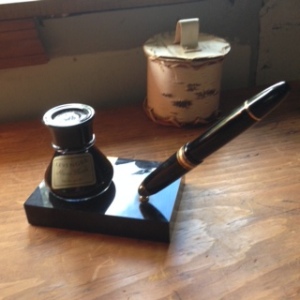 I got As in penmanship when I was a kid. I found an essay I had written my senior year of high school—don’t remember even what it was about, just that I was applying for some kind of senior-year prize. I could read every word. My penmanship was neat and even.
I got As in penmanship when I was a kid. I found an essay I had written my senior year of high school—don’t remember even what it was about, just that I was applying for some kind of senior-year prize. I could read every word. My penmanship was neat and even.
I don’t know when my penmanship turned illegible. You would never know my name by reading my signature. Sometimes, I can’t even discern what I was saying in my journals—not even by context. I’m certain there are brilliant gems, words of an insightful genius lost to posterity because it’s impossible to interpret the penmanship.
Lately, I’ve made a commitment to writing so I can read what I’ve written by hand.
Writing by hand. I call this writing acoustically. When I’m in my Writing Shed, I use a fountain pen—a black fat, elegant pen made by Mont Blanc and left to me by my mentor, Ed Brush. Recently, I have discovered Levenger ink—Raven Black.
My hand-written writing comprises two things: recording the Animal Tarot Cards I draw each day, and my morning pages. I sometimes skip my morning pages. I think that is okay.
As I wrote today, I noticed I was writing legibly, neatly, evenly, taking the time to form each letter, careful to spell words correctly, and punctuate for meaning. The slow flow of the ink filled the white space on the page letter-by-letter, word-by-word, sentence after sentence, paragraph after paragraph. Its clean smell wafted up from the page.
I slowed down. I took the time to smell the ink.
An actor friend wrote on his Facebook page today that he was taking his next step without a plan. His other plans had all fallen through, so he was just moving forward, leaving behind fear of what others thought of him, embracing his own life.
He was writing with ink.
My career path in life has been pretty non-existent. I got diverted from a career in health care administration when I quit a job after ending a relationship with my boss. I became a bar tender so I could spend time with my writing.
That was nearly 40 years ago. That decision was the turning point of my life—the moment I decided to embrace my own life, though I didn’t know it at the time. I backslid off and on, taking paths that had clearly marked signposts. I failed miserably anytime I tried. The signposts annoyed me.
Where Fred Astaire aspired for perfection, Gregory Hines would allow a mistake to take him to the next move, making it up as he went along if the occasion called for it.
He improvised.
It has occurred to me that improvisation, rather than a career, has determined my path in life.
The constant has been writing, though it has only been the last ten or so years that I found my voice.
I love writing on a computer. It allows me to keep pace when my mind is racing. Its fluid nature matches the way my mind writes, then edits. Backspacing letter by letter to erase a word, highlighting whole sentence or paragraphs to cut them, or cut then paste them somewhere else. Seeing the change instantly in black and white without the distraction of crossed out words, scratched out sentences or paragraphs, arrows and notes to indicate where to move a circled word, phrase, sentence, or paragraph.
It has its own flow—writing on a computer.
But writing by hand, with the pen that once belonged to Ed Brush, the flow of ink filling the empty page, the smell of ink transporting me into the moment—that’s an improvisational moment for me.
Much like life, there’s no Undo command when you write by hand. Make a mistake. Then improvise.

 “I wish I’d paid better attention. I didn’t yet think of time as finite. I didn’t fully appreciate the stories she told me until I became adult, and by then I had to make do with snippets pasted together, a film projected on the back of my mind.”
“I wish I’d paid better attention. I didn’t yet think of time as finite. I didn’t fully appreciate the stories she told me until I became adult, and by then I had to make do with snippets pasted together, a film projected on the back of my mind.”